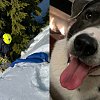The holidays are a wonderful time of year for people and their pets to be together with family.
Will you be giving your pet gifts for Christmas morning? Some great safe toys for dogs include rubber items like Kongs and stuffing-less plush toys, while cats may enjoy laser pointers or toys with feathers or catnip!
With any pet toy, it’s important to monitor their play to be sure that stuffing, string, or ribbons are not ingested, which could cause an unexpected intestinal blockage.
No one plans an emergency visit with their pets over the holidays, so here are some other common risks to avoid during the Christmas season.

Dogs
During the holiday season, many families enjoy sitting down to a delicious Christmas dinner and indulging in holiday treats. Some feel guilty for not sharing food with our furry family, but scraps or bones can be dangerous to dogs.
Dogs can risk choking or fractured teeth from bones, and giving dogs too many high-fat table scraps can result in vomiting, diarrhea, or pancreatitis in more serious cases.

There are also some common toxins to watch out for with family dogs over the holidays:
- Chocolate contains caffeine and theobromine, two compounds that are toxic to dogs. Symptoms of chocolate ingestion include vomiting, diarrhea, increased heart rate, restlessness, increased panting, and more in more serious cases: tremors, muscle spasms, and seizures.
- Xylitol is a sugar alternative and is very toxic to dogs. Examples of products that use xylitol are sugar-free gum, some baked goods, yogurts and puddings, cough syrups and even some peanut butter products. Symptoms of xylitol ingestion are vomiting, weakness, difficulty walking or standing, lethargy, and in serious cases seizures and coma.
- Grapes can be highly toxic to dogs, but especially raisins, which are used in a lot of holiday baking. Grapes and raisins can cause acute kidney failure, and symptoms may include vomiting, diarrhea, abdominal pain, loss of appetite, dehydration, and a serious decrease in urine production.

Cats

Cats are often less likely to get into toxic foods than dogs. Instead, common toxins to watch out for with our feline friends are holiday plants.
Lilies are highly toxic to cats. Even a small nibble to a petal, pollen, stem or leaf can cause acute kidney failure. Symptoms include vomiting, diarrhea, abdominal pain, loss of appetite, dehydration, seizures, and coma.
Poinsettias cause irritation to the skin and mucous membranes, with symptoms like drooling, lip licking, vomiting, and diarrhea.
Tulips also cause irritation to the skin and mucous membranes, but may also cause increased heart rate, panting, and difficulty breathing if parts of the bulb are ingested.
Click here for a complete list of pet toxins.

Shiny decorations are often mesmerizing for our feline friends! It is a good idea to keep wires, candles, decorations, ornaments, ribbons, and batteries in safe places that are difficult for pets to reach.
Christmas trees are known to be quite enjoyable for cats; they create a cozy hiding spot as well as a new object to play in! Ensure your tree is properly secured, and try to use plastic or unbreakable ornaments will reduce the risk of injury or damage if your tree comes down due to a curious kitty!
Outdoor hazards

Antifreeze has a sweet smell and taste and can be very appealing to animals. Even a small amount can be too toxic to a pet, so be sure to keep antifreeze out of the way, and to monitor pets closely when outside!
Road salt and other de-icing products can be hazardous to our pets’ paw pads, which can get cracked or dried out from walking on treated pavement. They may also lick their paws and ingest the salt, resulting in irritation and inflammation in the mouth and digestive tract.
Family gatherings can sometimes be stressful for pets if they get nervous around large groups of people or loud noises. Consider keeping them in a separate room away from the noise, with their food, water, toys and a bed so that they can stay comfortable.

With Christmas just around the corner, let’s keep our pets safe and happy this holiday season!

Pets First with Central Valley Veterinary Hospital offers monthly tips and information for pet owners in the Okanagan so that we can all stay safe and have fun with our furry friends in this beautiful valley! Central Valley Veterinary Hospital offers high-quality, compassionate care for your feline and canine companions.
For more information, please visit our website and Facebook page.
















